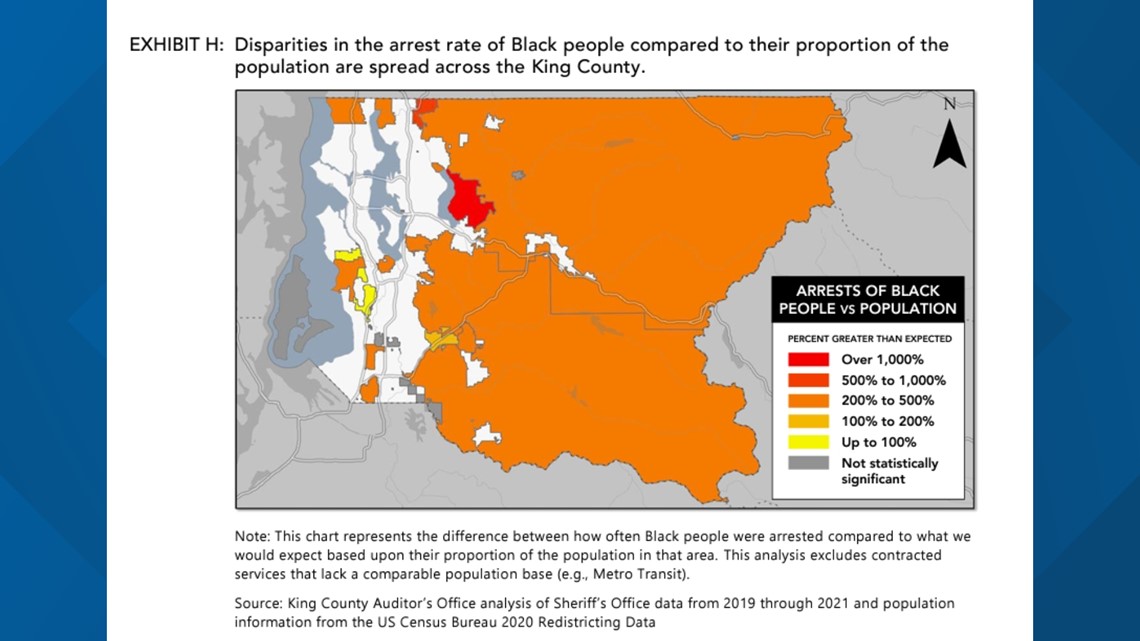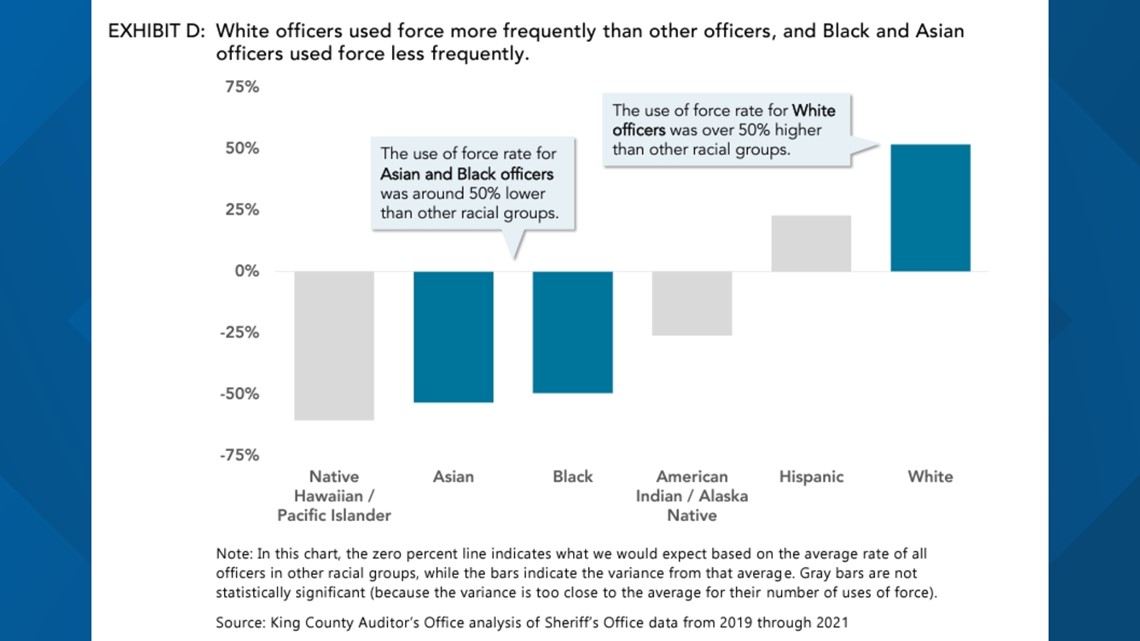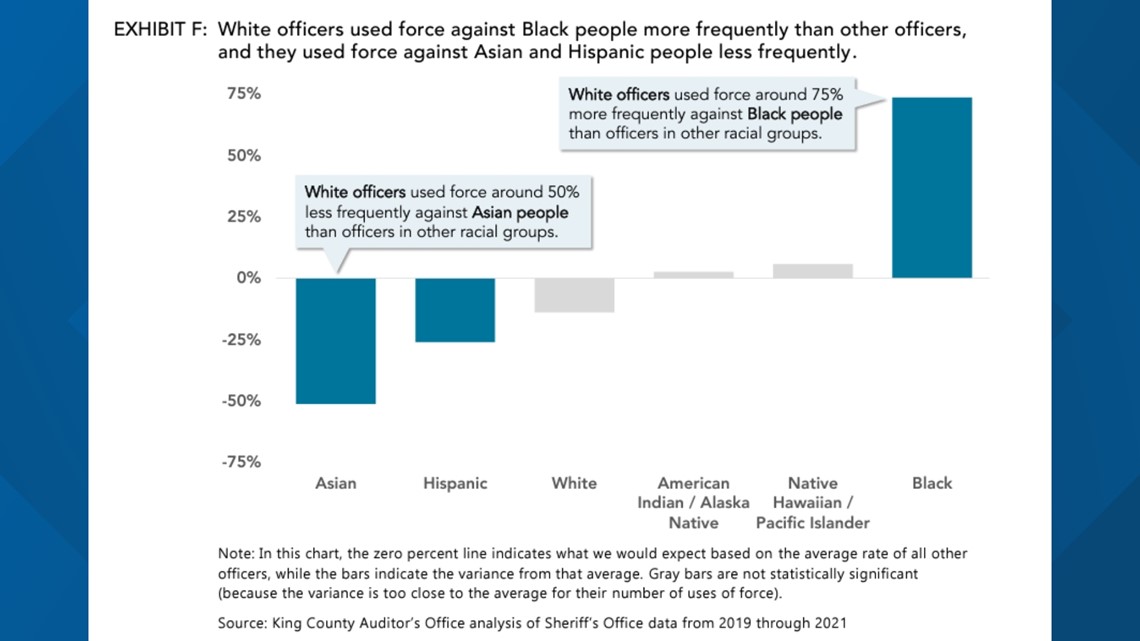KING COUNTY, Wash. — A King County audit released Tuesday revealed racial disparities in arrests and uses of force, a lack of comprehensive data to analyze the role of race in officer relations and highlighted several steps the King County Sheriff's Office can take to improve its equity and transparency.
The King County Auditor's Office said in its report analyzing the department's service calls from 2019-2021 that there were racial disparities in the numbers of arrests and uses of force.
The audit revealed Black people account for 25% of the arrests in incorporated King County, despite making up 7% of the population. The King County Sheriff's Office is 350% more likely to arrest a Black person for a crime given its proportion of the population, according to the audit. The disparities were found in nearly every jurisdiction in King County, creating what the audit called a "systemic issue across the county."
Officials said American Indian/Alaska Native, Native Hawaiian/Pacific Islander and Hispanic people were also arrested at a disproportionate rate in their latest findings.
"The causes of these disparities are complex and the Sheriff’s Office does not have sufficient data to explain them," the report stated.


More racial inequities were found in the 619 use of force incidents between 2019-2021, which represented 0.06% of the department's overall calls. Four of the instances involving use of force did not follow the King County Sheriff's Office's policy, according to the report.
In those use of force calls, auditors found white officers used force twice as often as Black and Asian officers. The report revealed white officers used force on 898 of 929,270 service calls in a three-year span, a rate of one per every 1,035 calls for service. The King County Auditor's Office said Black officers used force once every 2,326 calls and Asian officers used force once every 2,326 calls. In total, white officers were found to be 52% more likely to use force than officers in all other racial groups combined.


Officials said Hispanic people were 50% more likely to experience the use of force than other races in King County, compared to white people being 34% less likely. The audit's reporting indicated Black people were 29% more likely to be victims of use of force.
The report went further, finding white officers used force 75% more frequently against Black people than other officers in any other racial group. At the same time, these white officers were less likely to use force against Asian and Hispanic people than other officers of other races.
County auditors did not review the department's policies and procedures related to the use of force, nor the appropriateness of using force.
The King County Sheriff's Office public dashboard on its website shows use of force incidents from 2014-2019.


Information on racial identities during officer interactions was available in just 4% of calls, according to the latest findings. To ensure racial profiling does not occur, law enforcement agencies are advised to collect and analyze traffic stop demographic data, according to Washington state law. Auditors said the lack of available data makes it harder to analyze racial inequity and determine if there needs to be fundamental changes made within the department.
Part of the issue may be connected to King County code prohibiting the sheriff's office from collecting "perceived race data." Ordinance 18665 was passed in 2018 to ensure King County data and resources were not used to help federal government deportation efforts, but it may be the reason why officers are not collecting racial data in service calls, according to the audit.
There is no field to enter race in King County's current reporting system, the audit found. Previous King County Sheriff's Office leaders also told officers to not collect data about race in their service calls.
Dwight Dively, Chief Operating Officer in the Office of Performance, Strategy and Budget, said in a letter to auditors the department lacks the staffing to analyze race data even if it was collected.
In the next two years, Diveley said the King County Sheriff's Office hopes to get a new reporting system that may have the ability to record race.
The chief operating officer did add in the letter that "KCSO agrees that it is perceived race/ethnicity that is at the core of the biased and disproportional policing conversation."
Auditors said alternative policy methods could reduce the burden on officers and allow for licensed professionals to handle lower-risk calls. An analysis assessing risk factors found 58% of sheriff’s office service calls fall into the lowest-risk category. County auditors pointed to Phoenix and Austin using mental health providers instead of officers in certain calls as positive models for King County to replicate.
Dively said in the letter the King County Sheriff's Office has several programs that match law enforcement with behavioral health professionals.
"Excellent models exist in our region and throughout the country and KCSO looks forward to working with community to expand alternate policing programs," Dively wrote in the letter.
King County auditors outlined four recommendations for the King County Sheriff's Office to consider in the future: ensuring its dispatch system can collect race data, developing a policy allowing officers to collect data on perceived race, creating a department to analyze data and learning from other cities' alternative policing methods.
“We agree that disparities exist in the criminal legal system and although KCSO rarely uses force, 619 times in over a million calls for service over a three-year period, KCSO is committed to understanding and addressing the racial disparities identified by your analysis," Dively wrote in a letter. "We concur with your recommendations and believe they will result in better law enforcement practices.”
The King County Sheriff's Office serves a population of about 500,000 people in unincorporated parts of the county.



